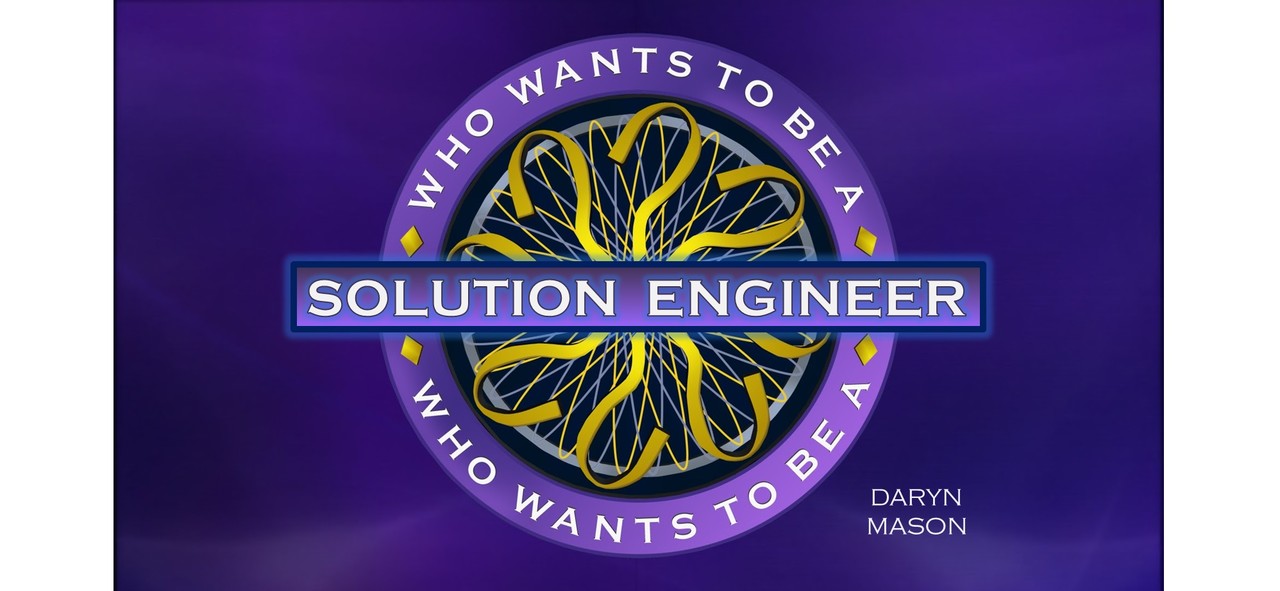
Who Wants To Be A Solution Engineer?
Solution Engineering: As exciting as a TV game show, but with NO lifelines!
Whether you call it pre-sales support, sales consulting, solution engineering or even solution architecture, there is no doubt that our profession is an exciting ride.
Recently I wrote about 4th Generation Solution Engineering. In this blog I expand upon the ideal skill set for today's pre-sales support professionals. I'm sure it's not comprehensive, so would welcome your comments and additions.
I've sketched a handy infographic check-list for you, and explained my thinking below.
Hierarchy Of Skills
Knowledge
The foundation layer of Solution Engineering is deep knowledge of your specialist area, but this is just the start. Usually, SEs will have a broad knowledge of their market and a deep understand of their specialist focus. This is often called the 'T-shaped' model [or 'Tree' model in my case!]
There’s usually a ton of stuff to learn, so unless SEs have a natural passion and curiosity for their domain then it’ll be a tough climb. So, fast learning needs to be matched with the motivation to get stuck in to the content.
Communication
As an SE, knowledge is worthless unless you have the communication skills to impart this in a compelling way. With customers it’s not simply about demonstrating software. You need to use all tools in your box to be spontaneous and responsive. The 4the generation SE needs to be creative about how they get their point across.
The SE's internal role within the organisation is often understated or forgotten. But we all know that the best SEs are champions for their specialist domain. They deploy their knowledge and communication skills to build expert communities and teach their protégés how to improve. They’re your advisors-in-residence and lubricate the company machine with their expertise.
Application
Deep knowledge and excellent communication skills, set SEs apart from other roles in your organisation. Meticulous discovery techniques and problem solving capabilities will allow SEs to craft solutions that not only meets a customers demands, but differentiates you from your competitors.
Internally, this means articulating a solution design that fits the sales objectives. Often this means composing the ‘Goldilocks’ solution: not too hot (over-engineered) so it blows the customer’s budget; not too cold that it’s unexciting and undifferentiated.
Emotional Intelligence
In my experience, emotional intelligence (EQ) is what separates the good from the great when it comes to Solution Engineering. Sure, the knowledge, communication skills and ability to apply them are essential pre-requisites, but you also need the X-factor.
The best SEs are likable, personable people. Whether you believe this is innate or learned behaviour, there are certain traits that are constantly repeated in these valuable individuals. Among them are empathy and authenticity. They have a high level of self-awareness and listen more than they talk.
Through active listening, they build empathy and trust with customers. When they do talk, they use storytelling and challenging skills to inspire customers. They paint a vivid picture of what your solution will mean to their business. Because of this close connection, they will often anticipate customer objections before they occur, enabling you to inoculate your solution against these potential blockers.
EQ is invaluable internally within organisations too. These SEs are adept at stakeholder management in complex environments. They use their wide network and reputation to negotiate the resources required to execute the optimum campaigns and are, therefore, the critical cog in the sales machine.
Smart organisations will use these high-EQ SEs for mentoring and coaching the next generation of top performers. Hang on to these people at all costs. They are priceless.
Set Your Own Targets
If all this sounds idealistic and unattainable, it’s not meant to be. I don’t want to be one of those bloggers who says “you‘re a failure unless you tick these 27 boxes.” Treat this like a Panini sticker album. Collect and refine the skills as you progress on your exciting career path.
Each of these skills represents a continuum from beginner to expert, and in Solution Engineering there’s always something new to learn. Aspiring to SE greatness is a journey, not a destination.
What do you think? Have I missed any major skills? I’d love to hear from you whether you’re a practicing SE or in a related discipline.
I enjoy blogging about Customer Experience, Digital Marketing and, occasionally, Solution Engineering.
Related article: 4th Generation Solution Engineering
You can view my other blog posts here. And why not follow me on Twitter: @CxDaryn


Leader on transformation and adaptability of mine operations.
1yIgnacio Jansson Verdugo Francisco Toncio Arcos Diego Arce Silva Sebastián Rejas Ossandón Franco-Guillermo Villarroel Millaray Farias Villegas Pablo Avalos Castillo Ernesto Labbé Javiera Proboste Torres Nolberto Ignacio Vega Carrasco
Principal Partner Sales Leader for EMEA at Deltek
3yGreat article Daryn and I love the artwork 😀
Technology & Innovation Manager at Esri Spain
3yMy 50 cents here. I´ll add "technical assertiveness" meaning the ability to defend and convince internally and to the customer, that the solution you are proposing is the best one for the problem or business challenge. In some cases, either the customer or the sales people are looking to solve something with pre-existing methods or technologies but, could be alternatives ways to see the problem. Having both the ability to see things differently and to make the case for this alternative approach is very important too!
Experience in engineering process design, industrial equipment and semi-trailer global trade. Experience in IT pre-sales,SE program mgmt,Customer Success Service in the US, China, and Korea.
4yGreat Article. It contains all the skills SE must have and have to try to increase. I will keep following your posting about SE
Head of Operational Systems at Content+Cloud
5yExcellent article... a must-read for aspiring consultants wanting to improve their game!